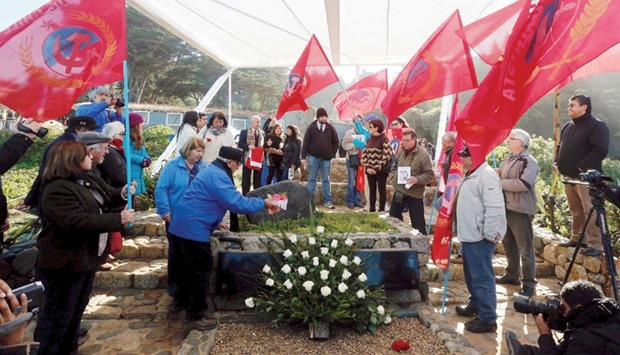
Members of the communist party pay tribute next to the tomb of Nobel laureate Pablo Neruda during the reburial of his remains inside of his house-museum in Isla Negra city, Chile, yesterday.
Chile yesterday reburied Nobel prize-winning poet Pablo Neruda’s remains after exhuming them to determine whether he was assassinated by late dictator Augusto Pinochet’s regime - a mystery that still lingers.
Three years after they were disinterred to be tested for traces of poison, a casket bearing Neruda’s remains was buried at his former home in the resort town of Isla Negra, facing the Pacific ocean in line with his last wishes.
Neruda, a celebrated poet, politician, diplomat and bohemian, died in 1973 aged 69, just days after Pinochet, then the head of the Chilean army, overthrew Socialist president Salvador Allende in a bloody coup.
The writer, who was also a prominent member of the Chilean Communist party, had been preparing to flee into exile in Mexico to lead the resistance against Pinochet’s regime.
He died in a Santiago clinic where he was being treated for prostate cancer - the official cause of his death.
But doubts have surrounded his death since his former driver claimed Neruda was given a mysterious injection in his chest.
An international team of specialists who examined the remains are due to release their findings in May.
Forensic scientists at the University of Murcia in Spain said last year they had identified a massive, unexplained bacterial infection in Neruda’s remains, rekindling his family’s suspicions.
The Chilean interior ministry said the strain of bacteria, Staphylococcus aureus, does not occur naturally and may have been grown in a lab. DNA analysis of the bacteria is ongoing.
In February, a Chilean court ordered the poet’s remains to be returned to his grave. The judge told forensic analysts to keep small bone samples on hand for further tests, if needed.
Neruda won the Nobel prize in 1971 “for a poetry that with the action of an elemental force brings alive a continent’s destiny and dreams,” in the words of the award committee.
The lawyer who brought the case to have the remains examined, Eduardo Contreras, told AFP that since so much time had passed, there was a risk the tests would be inconclusive.
“Even though all the evidence points to a crime, it will be technically very difficult to prove,” he said.
But “anyone who sees the thousands of volumes of evidence” will conclude that Neruda was assassinated, he added.
Pinochet, who ruled Chile for 17 years, installed a regime that killed some 3,200 leftist activists and other suspected opponents. He died in 2006 at age 91 without ever being convicted for the crimes committed by his regime. Twenty-six years after the return to democracy, Neruda is hailed as a hero in his home country.
His coffin, draped in a red, white and blue Chilean flag, lay in state in the Congress in Santiago on Monday after being transferred from the forensic medical service where it was examined. Some 20 family members and officials at the foundation that handles Neruda’s works were present yesterday as the flag-draped casket was lowered back into the ground at his scenic, boat-shaped house overlooking the Pacific coast.
A small group of Communist party activists watched from a distance, breaking into chants honoring “comrade Pablo Neruda.”
He was laid to rest alongside his late wife and muse, well-known soprano Matilde Urrutia.
“I feel proud that they listened to me once and for all,” the poet’s former driver, Manuel Araya, said.
